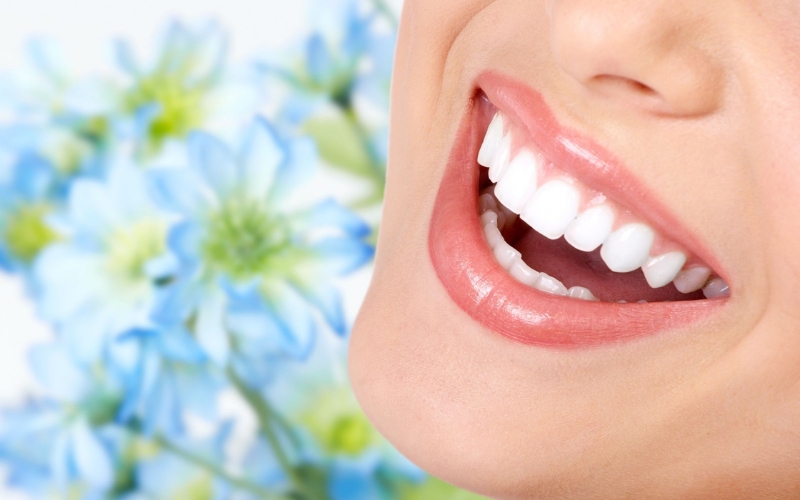(703) 372-5665
How Does Your Diet Affect Teeth Whitening Results?

How Does Your Diet Affect Teeth Whitening Results?
Many people want to have a white, bright smile, especially after getting teeth whitening procedures. Whether you’ve opted for natural solutions, professional in-office whitening, or at-home whitening strips, the effectiveness and durability of your results can be greatly influenced by your diet.
While bad eating habits can reverse all of your hard work, a well-balanced diet can help you keep your teeth white. This blog will discuss how certain meals and beverages affect the outcomes of teeth whitening and offer helpful advice on maintaining the brightest smile possible.
Teeth Whitening and Its Effectiveness
Teeth whitening works by breaking down the stains on your teeth, which can be caused by various factors such as aging, tobacco use, certain foods and drinks, or poor oral hygiene. The goal is to lighten the color of your enamel, making your teeth appear whiter.
However, this process is not permanent, and the longevity of the whitening results depends on both the treatment used and your lifestyle choices—particularly your diet.
How Diet Can Affect Your Teeth Whitening Results?
Certain foods and drinks can either enhance or sabotage your whitening efforts. Let’s take a closer look at how specific types of food and drink influence your smile.
1. Foods That Stain Your Teeth
Some foods and beverages are notorious for staining teeth, and consuming them regularly can reverse the effects of whitening treatments. These stain-producing culprits contain pigments that cling to your enamel, leading to discoloration.
- Coffee and Tea: Both dark coffee and tea are rich in tannins, which can cause yellowing of the teeth over time. Coffee can also dry out the mouth, reducing saliva that naturally cleans your teeth.
- Red Wine: Red wine is packed with polyphenols and tannins that contribute to staining. Its deep color also increases the likelihood of it sticking to your teeth.
- Berries: Blueberries, blackberries, and other dark fruits are delicious, but their intense pigments can leave behind stubborn stains.
- Soy Sauce: Though a staple in many dishes, soy sauce is dark and acidic, making it a prime candidate for discoloration.
- Tomato-Based Sauces: Rich in acid and color, tomato sauces can also stain your teeth if consumed frequently.
Tip: If you consume these stain-causing foods, try drinking water immediately afterward to rinse away the pigments and minimize staining.
2. Acidic Foods & Beverages
Highly acidic foods and drinks can erode enamel, which can make your teeth more susceptible to staining. When enamel thins, the underlying yellowish dentin is exposed, which can make teeth appear dull or yellow.
- Citrus Fruits: Lemons, oranges, and grapefruits are packed with citric acid, which can erode the enamel on your teeth.
- Soda: Both regular and diet sodas are acidic and contain sugar that can lead to plaque buildup and increased staining. Dark sodas, in particular, can stain teeth.
- Vinegar: Salad dressings and foods made with vinegar can also contribute to enamel wear, making teeth more prone to stains.
Tip: To protect your enamel, try eating acidic foods in moderation and rinse your mouth with water after consuming them. If possible, wait 30 minutes before brushing your teeth to prevent enamel erosion.
3. Foods That Help Maintain Teeth Whitening Results
On the other hand, some foods can actually help maintain or even enhance your whitening results. These foods are usually rich in water content or help to remove plaque and buildup from your teeth.
- Apples and Pears: These crunchy fruits have high water content and a natural abrasiveness that can help clean your teeth. They also stimulate saliva production, which helps neutralize acids and wash away food particles.
- Carrots and Celery: These raw vegetables are not only healthy for your body but also work as natural abrasives to clean your teeth. Their crunchiness can help scrub off plaque and debris, keeping your teeth fresh.
- Cheese: Cheese, especially hard cheeses like cheddar, can help neutralize acids in the mouth, reducing enamel erosion and promoting remineralization. It also encourages saliva production, which helps maintain oral hygiene.
- Strawberries: While they are mildly acidic, strawberries contain malic acid, which can naturally whiten teeth. The high fiber content also helps scrub teeth clean.
- Water: Drinking plenty of water throughout the day is one of the best things you can do for your teeth. Water helps wash away food particles and bacteria, keeping your mouth hydrated and reducing the risk of staining.
Tip: Incorporate these teeth-friendly foods into your diet to help maintain your whitening results and support your overall oral health.
4. Beverages That Aid in Maintaining a Bright Smile
While some drinks can stain your teeth, others help prevent staining and protect enamel.
- Water: The best beverage for your teeth. It helps wash away food particles and bacteria, and it keeps your mouth hydrated, ensuring that your enamel remains strong.
- Milk: The calcium in milk helps strengthen teeth, while the proteins in milk protect the enamel from damage. Drinking milk after acidic or sugary foods can help neutralize acids.
- Green Tea: Unlike black tea, green tea contains antioxidants called catechins that can prevent staining and reduce plaque buildup.
Tip: Whenever possible, choose water or milk over acidic and sugary beverages to protect your smile.
Practical Tips To Protect Your Whitening Results
To ensure your whitening results last as long as possible, follow these practical tips:
- Brush and Floss Regularly: Keeping your teeth clean is the best way to preserve your whitening results. Brush your teeth twice a day with whitening toothpaste and floss daily to remove plaque and food particles.
- Avoid Smoking or Tobacco Use: Smoking and chewing tobacco can cause severe staining, which can quickly undo the effects of your whitening treatment.
- Use a Straw: When drinking beverages like coffee, tea, or soda, use a straw to minimize contact with your teeth. This can reduce the chances of staining.
- Schedule Regular Dental Checkups: Routine cleanings and checkups to our professional dentist help maintain your smile and ensure that your teeth stay bright and healthy.
The Key To Lasting White Teeth
Diet plays a significant role in the effectiveness and longevity of teeth whitening results. By avoiding stain-causing foods & drinks and incorporating tooth-friendly options into your diet, you can enjoy a brighter smile for longer.
Keep in mind that teeth whitening isn’t a one-time solution but rather a commitment to maintaining your oral hygiene and making mindful dietary choices. With the right care and attention, you can ensure that your bright, white smile lasts for years.
Remember, it’s not just about what you eat but also how you care for your teeth. Combine a healthy diet with good oral hygiene practices, and you’ll be on your way to keeping your smile sparkling!






